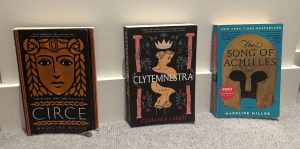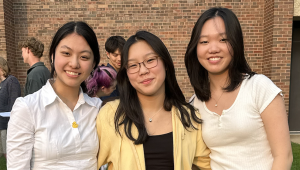Here’s why I dropped the Droid
The past me would not be happy with the present me

January 29, 2016
Since I got the iPhone 3GS in 2010, I’ve had eight smartphones. Five of them were iPhones and three of them were Android phones. I, along with most New Trier students, carry a shiny new iPhone and there’s a one-word reason why: prestige.
If you have an iPhone, you have an iPhone. You have power and privilege. You belong with the rest of a big world that sends those blue bubbles back and forth and chimes that familiar marimba sound that can send a whole room diving into their pockets.
What companies like Apple, Starbucks and Beats by Dre have in common is that they put all of their efforts into advertising and making consumers understand that these products are for everyone, and that’s why they sell so much.
None of these first world commodities are the best bang for your buck. These products are not inherently better than products with a main focus on quality and value, but these corporations spend far more time and money making consumers think they are.
Now, this isn’t to say that an iPhone is a bad smartphone. It’s far from it. iPhones are consistently exceptional devices, at least until Apple thinks you should buy a new one.
They are widely regarded as the best all-around phone by most tech critics every September because they’ve been incrementally perfecting their product since the initial release in 2007.
One of the bigger edges Apple has over every Android manufacturer is that it doesn’t need some absurd hardware to make their phone run smoothly. Apple’s specifications are laughed at by critics until they get their hand on the device and never want to let go because the phone runs smother than even the most outrageously overpowered Android phones.
The most important example of this is that an iPhone battery is only about 50-66% the size of the average Android battery, and the iPhone typically lasts longer and charges faster than the average Android phone.
The iPhone just works like it’s supposed to. I can use it anywhere at any time, and if something breaks, I can take it to any of the 481 Apple Stores around the world to get it fixed.
Getting a new iPhone, which I can do every year because of my financing plan, is like buying the brand new edition of a college textbook: you would be at a disadvantage if you bought an older version.
iPhones are also generally more universal than Android phones. Even though Samsung has about 10% more adoption from smartphone users than Apple does, Samsung released 27 new smartphones last year compared to Apples two flagships.
This means there are more top of the line iPhone units in circulation than top of the line Samsung units and this will give case/accessory manufacturers more incentive to design for Apple and makes it hard for Android users to find accessories.
Android’s biggest problem is system fragmentation, which is when the Android ecosystem is broken up into smaller parts because different manufacturers develop custom software on top of the underlying Android OS.
This results in bugs and an all around lack of support because of the open source nature of Google’s OS.
If you have a Nexus (Google’s flagship) this isn’t a problem because Android was built for Nexus phones, similar to how iOS is built for iPhones.
But if you have a phone from any other manufacturer (excluding Motorola), you will be waiting between several and infinite months to get a software update because developers have to account for compatibility with custom software.
Despite the older versions of the Android OS running fairly well, everyone knows that Apple releases a new iPhone and a new stable feature-packed version of iOS every September.
And it’s designed so that almost every iPhone can run it. Having an iPhone makes your connected lifestyle simple and easy.
Beyond all of the specific reasons, New Trier students, and people in general use iPhones because the phones work and everyone they know uses them. Admit it, you get really annoyed when you’re texting someone who has the green bubbles instead of the blue ones or you have to call them instead of FaceTime. I like my iPhone because it just works. I don’t think I will go back to using any more Android train wrecks anytime soon.











































